2024年中考英语语法部分知识汇总
图片预览
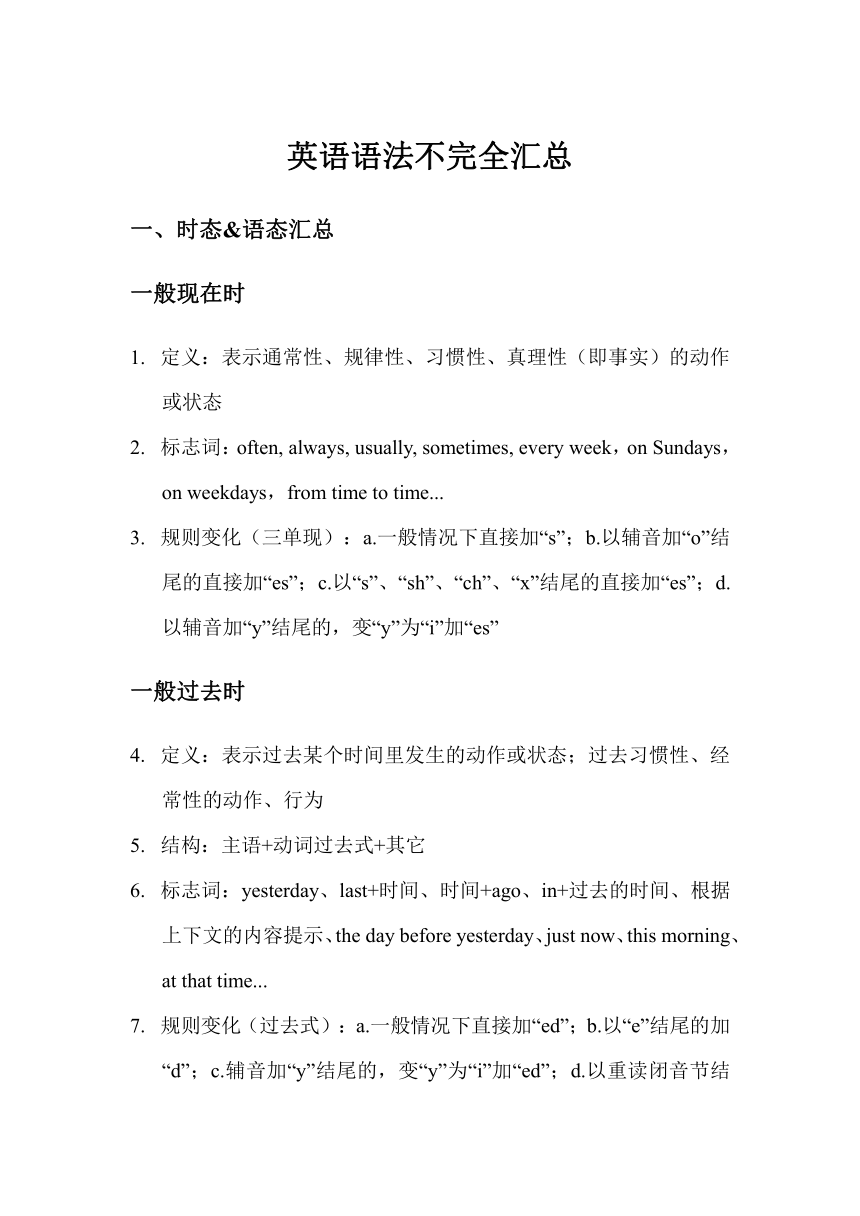
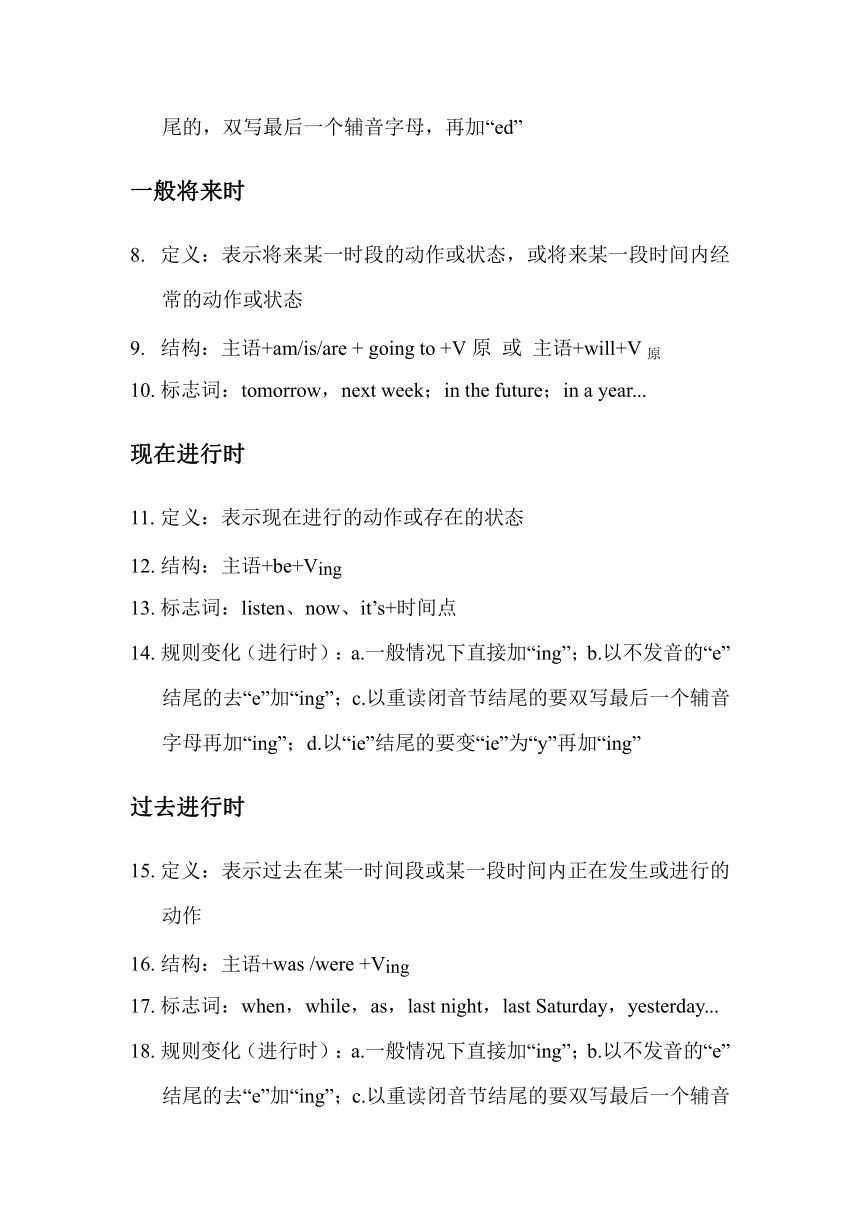
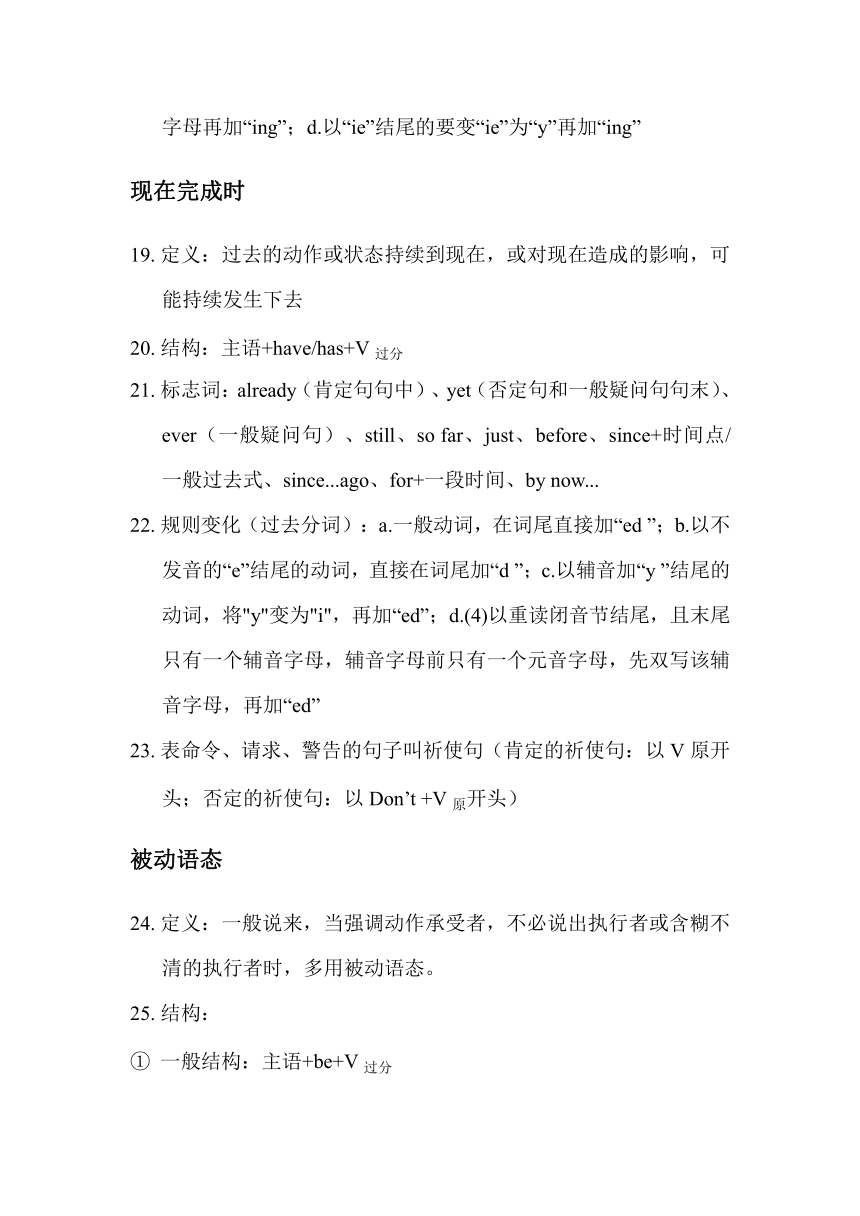
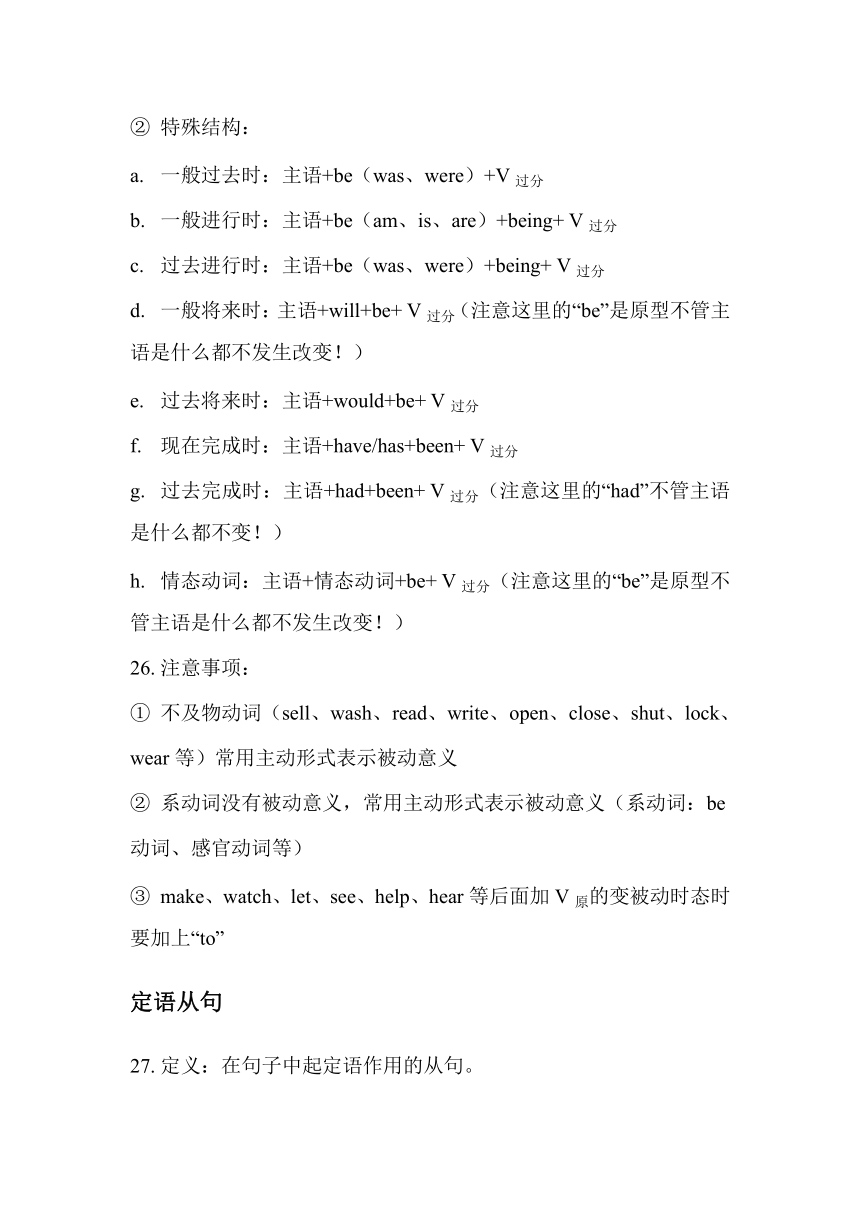
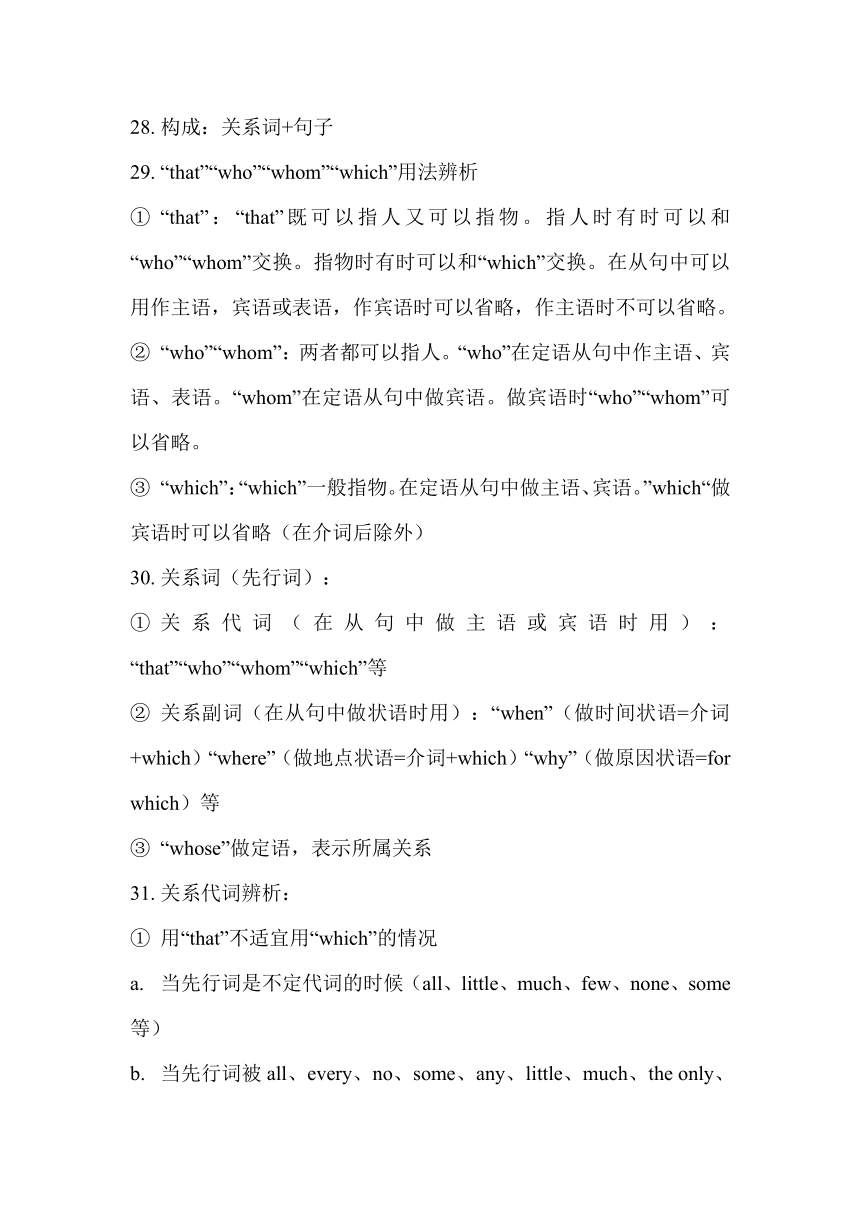
文档简介
英语语法不完全汇总
一、时态&语态汇总
一般现在时
定义:表示通常性、规律性、习惯性、真理性(即事实)的动作或状态
标志词:often, always, usually, sometimes, every week,on Sundays,on weekdays,from time to time...
规则变化(三单现):a.一般情况下直接加“s”;b.以辅音加“o”结尾的直接加“es”;c.以“s”、“sh”、“ch”、“x”结尾的直接加“es”;d.以辅音加“y”结尾的,变“y”为“i”加“es”
一般过去时
定义:表示过去某个时间里发生的动作或状态;过去习惯性、经常性的动作、行为
结构:主语+动词过去式+其它
标志词:yesterday、last+时间、时间+ago、in+过去的时间、根据上下文的内容提示、the day before yesterday、just now、this morning、at that time...
规则变化(过去式):a.一般情况下直接加“ed”;b.以“e”结尾的加“d”;c.辅音加“y”结尾的,变“y”为“i”加“ed”;d.以重读闭音节结尾的,双写最后一个辅音字母,再加“ed”
一般将来时
定义:表示将来某一时段的动作或状态,或将来某一段时间内经常的动作或状态
结构:主语+am/is/are + going to +V原 或 主语+will+V原
标志词:tomorrow,next week;in the future;in a year...
现在进行时
定义:表示现在进行的动作或存在的状态
结构:主语+be+Ving
标志词:listen、now、it’s+时间点
规则变化(进行时):a.一般情况下直接加“ing”;b.以不发音的“e”结尾的去“e”加“ing”;c.以重读闭音节结尾的要双写最后一个辅音字母再加“ing”;d.以“ie”结尾的要变“ie”为“y”再加“ing”
过去进行时
定义:表示过去在某一时间段或某一段时间内正在发生或进行的动作
结构:主语+was /were +Ving
标志词:when,while,as,last night,last Saturday,yesterday...
规则变化(进行时):a.一般情况下直接加“ing”;b.以不发音的“e”结尾的去“e”加“ing”;c.以重读闭音节结尾的要双写最后一个辅音字母再加“ing”;d.以“ie”结尾的要变“ie”为“y”再加“ing”
现在完成时
定义:过去的动作或状态持续到现在,或对现在造成的影响,可能持续发生下去
结构:主语+have/has+V过分
标志词:already(肯定句句中)、yet(否定句和一般疑问句句末)、ever(一般疑问句)、still、so far、just、before、since+时间点/一般过去式、since...ago、for+一段时间、by now...
规则变化(过去分词):a.一般动词,在词尾直接加“ed ”;b.以不发音的“e”结尾的动词,直接在词尾加“d ”;c.以辅音加“y ”结尾的动词,将"y"变为"i",再加“ed”;d.(4)以重读闭音节结尾,且末尾只有一个辅音字母,辅音字母前只有一个元音字母,先双写该辅音字母,再加“ed”
表命令、请求、警告的句子叫祈使句(肯定的祈使句:以V原开头;否定的祈使句:以Don’t +V原开头)
被动语态
定义:一般说来,当强调动作承受者,不必说出执行者或含糊不清的执行者时,多用被动语态。
结构:
① 一般结构:主语+be+V过分
② 特殊结构:
a. 一般过去时:主语+be(was、were)+V过分
b. 一般进行时:主语+be(am、is、are)+being+ V过分
c. 过去进行时:主语+be(was、were)+being+ V过分
d. 一般将来时:主语+will+be+ V过分(注意这里的“be”是原型不管主语是什么都不发生改变!)
e. 过去将来时:主语+would+be+ V过分
f. 现在完成时:主语+have/has+been+ V过分
g. 过去完成时:主语+had+been+ V过分(注意这里的“had”不管主语是什么都不变!)
h. 情态动词:主语+情态动词+be+ V过分(注意这里的“be”是原型不管主语是什么都不发生改变!)
注意事项:
① 不及物动词(sell、wash、read、write、open、close、shut、lock、wear等)常用主动形式表示被动意义
② 系动词没有被动意义,常用主动形式表示被动意义(系动词:be动词、感官动词等)
③ make、watch、let、see、help、hear等后面加V原的变被动时态时要加上“to”
定语从句
定义:在句子中起定语作用的从句。
构成:关系词+句子
“that”“who”“whom”“which”用法辨析
① “that”:“that”既可以指人又可以指物。指人时有时可以和“who”“whom”交换。指物时有时可以和“which”交换。在从句中可以用作主语,宾语或表语,作宾语时可以省略,作主语时不可以省略。
② “who”“whom”:两者都可以指人。“who”在定语从句中作主语、宾语、表语。“whom”在定语从句中做宾语。做宾语时“who”“whom”可以省略。
③ “which”:“which”一般指物。在定语从句中做主语、宾语。”which“做宾语时可以省略(在介词后除外)
关系词(先行词):
① 关系代词(在从句中做主语或宾语时用):“that”“who”“whom”“which”等
② 关系副词(在从句中做状语时用):“when”(做时间状语=介词+which)“where”(做地点状语=介词+which)“why”(做原因状语=for which)等
③ “whose”做定语,表示所属关系
关系代词辨析:
① 用“that”不适宜用“which”的情况
a. 当先行词是不定代词的时候(all、little、much、few、none、some等)
b. 当先行词被all、every、no、some、any、little、much、the only、the every、the right、the last、few、just等修饰时
c. 当先行词被序数词或者形容词最高级所修饰时
d. 当先行词本身就是序数词或者是形容词最高级
e. 当先行词既有人又有物时
f. 当主句是“whom”“who”开头的特殊疑问句时
② 用“which”不适宜用“that”的情况
a. 当关系代词前有介词或者是指物或事时
b. 当先行词本身就是“that”时
③ 用“who”不适宜用“that”的情况
a. 当先行词是指人的不定代词时(one、anyone、those等)
b. 当先行词指人并含有较长的后置定语或者在被分割的定语从句中时
比较级(两者之间的比较)
变化规则:a.一般情况下直接加“er”;b.以“e”结尾的直接加“r”,以辅音加“y”结尾的,变“y”为“i”加“es”;c.以重读闭音节结尾的双写最后一个辅音字母,再加“er”;d.部分双音节词比较级要在前面加“more”;e.以“ly”结尾的,除“early”以外比较级都要在前面加“more”注意:①“a lot”、“a bit”、“a little”、“much”、“even”均可以修饰比较级②比较级的特殊情况:a.“越...就越...”,结构:the+比较级,the+比较级;b.“越来越...”,结构:比较级and比较级(单音节词),more and more+多音节词
最高级:(三者之间的比较)
规则变化:a.一般情况下直接加“est”;b.以“e”结尾的直接加“st”,以辅音加“y”结尾的,变“y”为“i”加“est”;c.以重读闭音节结尾的双写最后一个辅音字母,再加“est”;d.部分双音节词比较级要在前面加“most”;e.以“ly”结尾的,除“early”以外比较级都要在前面加“most”注:最高级前面要加“the”,但副词的最高级前“the”可以省去
二、语法&固定搭配汇总
“am”用于第一人称“我”;“are”用于第二人称复数、第三人称复数或其他人称复数;“is”用于第三人称单数
“if”和“as soon as”引导条件状语从句,遵循“主将从现”的原则
“Wh”词和“how”+to+V原
A and B’s +单数形式 某人和某人相同的
a better understanding of 更好的理解…
a couple of 一对;两次
a kind of一种
a number of+可数名词(a lot of) 许多
a photo of him(照片上的那个人是他)
a photo of his(照片属于他,但是照片上的人不一定是他)
a symbol of ...的象征
A’s and B’s +复数形式 某人和某人不同的
about one’s age 与某人年龄相仿
adj./adv. enough to do 足够...去做某事
admire sb./sth. for sth./Ving 因…而钦佩…
against+Ving 反对做
allow to do sth.允许去做某事
also 肯定句句中
another 另一;再一
another+数字+名词(数字+more+名词) 另几个,再几个
any+名词单数(不同范围);any other+名词单数(同一种范围同种类);the other+名词复数(同一种范围同种类)
argue with sb. 与某人争吵(=have an argument with sb.)
arrive at+小地点;arrive to+大地点(后面跟“home”“here”“there”时省去介词)
as …as 某某 can/could 尽某人最大的…(=as … as possible)
as+adj./adv.原级 as 与...一样...
As——As’ 某人的
ask for... 寻求...
ask sb. about sth. 询问某人关于某事
ask(tell) sb.(not) to do 叫某人(不要)做某事
at a speed of …的速度
at the end of 在...的末端(结尾)
attend 出席(正式活动)
avoid+Ving 避免做
be able to 能够做
be absent from 缺席
be afraid of+n. 害怕
be afraid to do+V原
be allowed to do sth. 被允许去做某事
be allowed to do 被允许去做某事(=allow doing)
be angry with sb. 生某人的气
be born with 天生具有
be busy with sth./doing 忙于某事
be careful with 小心地用
be close to 离...很近
be comfortable doing sth. 做…很流畅
be covered with用...覆盖着
be different from 与...不同
be different from(make a difference from) 与...不同
be due to 预期做
be excited about 对...感到兴奋
be expected to do 应该做
be famous as 作为...而出名
be famous for 以...而出名
be far from 离...很远
be filled with 充满;装满(=be full of)
be friendly to sb. 对某人很友好
be good at 擅长于(=do well in)
be good for 对...有益
be good to 做...很好
be good with 与...相处很好;善于应付...的
be interested in 对...感兴趣(=take an interest in)
be known as 作为...而出名
be known for 以…而出名
be mad at 对某人生气(=get mad at)
be made form 由…制成(看不见原材料)
be made in 在…制成
be made of 由…制成(看得见原材料)
be nervous about 对...感到焦虑
be proud of =take pride of 以...为傲
be satisfied with 对...满意
be short of 短缺
be special to sb. 对某人来说很特别
be stressed out 有压力
be strict with sb. 对某人要求严格
be suitable for 适合
be suitable to do 适合做
be supposed to do 应该做
be sure that+句子 确信...
be sure to do sth.做...有把握
be surprised at sth.对某事很惊讶
be surprised to do sth. 很惊讶的去做某事
be talented in 在哪方面有天赋
be up to 由...决定
be used as+n. 当作…来用
be used by sb. 被某人用
be used for doing sth. 被用来
be used to do 被用来做某事
be used to+Ving 习惯于做某事
be worth doing 值得做
because of+名词/Ving/代词宾格
because+句子
because与but不能连用,although(though)与but不能连用
belong to sb. 属于某人
below:不接触,不是垂直关系,与above相对,此外也表示温度;under:有接触,垂直的下方,与over相对,此外也表示数量
besides 包括对象在内
borrow...from 从...借进
both两者都,neither两者都不;all三者或三者以上都;none三者或三者以上都不
bring sth. to把某物带到...
buy sth. for sb.=buy sb. sth.
by oneself 自己
by the end of 截止...的最后
by+Ving 通过做...
can’t stand+名词+代词宾格+Ving 无法忍受
can’t stop to do sth.无法停止做...
can’t wait to do 迫不及待去做某事
cheat sb. (out)of (尤指不正当手段)骗取某人某物
cheer up+名词
choose to do 选择去做...
come up with 想出,提出
communicate with sb. 与某人交流(=have a communication with sb.)
compare A to B 把A比作B
compare A with B 把A和B进行比较
connect A with B 把A和B连接起来
consider doing sth.考虑做某事
consider to do sth. 考虑去做某事
continue doing sth. 继续做某事
continue to do sth. 继续去做某事
continue with 继续
dare to do 敢于去做
decide to do(=make a decision to do)决定去做某事
either 否定句句末
either...or... 要么...要么...(就近原则——谓语动词与“or”后动词保持一致)
encourage sb. to do sth. 鼓励某人去做某事
end up as 作为…而结束
end up doing 以做…而结束
enjoy +Ving 喜欢做某事
enjoy oneself 玩得开心(=have fun;have a good time)
everything做主语,谓语动词用单数
except that+句子 期待...
except 把对象除在外
except(sb.)to do sth.期待(某人)去做某事
explain sth. to sb.向某人解释某物
explain that+句子 解释....
explain to sb. 向某人解释
fail to do sth. 做…失败了
fall in love with 爱上...
feel like +Ving 感受到
find/believe/make it+adj. to do sth. 发现做某事是...的
finish+Ving
forget doing忘记已经做了某事
forget to do 忘记去做
get good grades in 在哪方面取得好成绩
get good scores on 在哪方面取得好成绩
get hit on +身体部位 by身体的某个部位被...所撞击
get in the way of 阻碍,妨碍
get into a fight with sb.与某人吵架/打架
get on with sb. 与某人相处
get one’s ride 搭某人便车
get to+地点(后面跟“home”“here”“there”时省去介词)
get/have sth. done 让某事/某物怎么样
give advice to sb. 给某人建议
give sb. a hug 给某人一个拥抱
give up+Ving 放弃做某事
go +娱乐活动动词的ing形式 去...
go on doing sth. 继续做某事
go out of one’s way to do 格外地去做
had better (not)+V原 最好(不要)做某事
halfway to+Ving 做...成功了一半
happen to do sth.碰巧做某事
happen to sb.发生在某人身上
happen 偶然发生的
hate doing sth. 讨厌做某事
hate to do sth. 讨厌做某事
have a hard time+Ving 做某事很艰难
have a influence on 对…产生了影响
have been in/at 在某地
have been to 去过某地(已回)
have fun doing sth.做某事过得愉快(=have a great time doing sth.)
have gone to 去过某地(未回)
have no choice but to do别无选择做…
have problem (in)doing 做某事有困难(=have difficulty in doing;have trouble in doing)
have/do an excellent job in 在哪方面很优秀
help sb. to do 帮助某人做某事
help sb. With sth. 在某方面帮助某人
help sb. with 帮助某人某事
hind sth. from sb. 把...远离...
hurry to do 匆忙地做
imagine+Ving 想象做某事
in case of+n./代词宾格 (句首)万一;(句末)以防万一
in case 既然那样
in case 万一
in front of 在...前面(外部);in the front of 在...前面(外部)
in one’s opinion 依...看
in surprise 惊奇地
in the case of 至于,在…的情况
in the end (=at last) 最后
in the middle of 在...的中叶
in the praise of 作为对…的赞美
in+年份/月份;on+具体某一天
instead用句末;instead of用句中
introduce sb./sth. to sb. 向某人介绍某人/某物
invite sb. to do sth. 邀请某人...
It seems that+句子
It takes sb. 时间/金钱 to do sth.
it’s +adj. for sb. to do 对于某人来说做什么怎么样
it’s one’s job/duty to do 做...使某人的职责/义务
join in 参加(…的活动;…的游戏)
join 参加(…的组织)
keep doing sth.一直做某事
keep on doing sth. 坚持做某事(中间有间歇)
keep sth. done 使...保持...
keep sth. in mind记住某事
keep..away from 远离...
kick sb. off 开除某人
kind of+adj. 有点儿,稍微
kinds of各种各样的
laugh at sb. 嘲笑某人
lead sb +地点 引领某人去
leave one’s job 辞职
lend sb. to do 引导/促使某人做
lend to 导致;通向
lend...to 把...借出
lift sb. up举起,鼓舞
little +不可数名词(表否定);few +可数名词复数(表否定);a little+不可数名词(表肯定);a few+可数名词复数(表肯定)
look forward to+Ving 期待做...
look up to 钦佩
make +V原/adj.
make a progress 取得进步
make an effort in 在…方面做出努力
make an effort to do 做出努力去做
make friends with 与...交朋友
make it possible for sb. to do 使某人做某事成为了可能
make mistakes in 在…方面犯错
make one’s way to 尽力赶往...
marry sb.(=get married to sb.)与某人结婚
maybe放句首,may be放句中
mention doing 提到做某事
mention sth. to sb. 向某人提到某事
mind+Ving 介意做...
neither..nor..既不...也不...(就近原则)
not as/so +adj./adv.原级 as 与...不一样...
not only…but also 不仅…而且(就近原则)
not...until 直到...才(引导时间状语从句)
offer sb. sth. =offer sth. to sb.
on+电子设备
one of +可数名词复数 is/谓语动词单数
one’s love for 对...的热爱
other(不特指,泛指)+名词
others(不特指,泛指)=other+名词复数
pay attention to 注意(后面可以加Ving)
percent作主语时,谓语动词其后的数要根据其后名词来决定,即xx% of 名词+V
places of interest 名胜古迹
plan to do sth.(=make a plan to do sth.)打算去做...
play a joke one sb. 对某人开玩笑
play a part in 参与到...
play a role in在...发挥作用
play a trick on sb. 对某人开玩笑
play+the+音乐器材
play+球类名词
point at指近处;point to指远处
population作主语时谓语动词用单数
practice+Ving
praise sb. for 因…而赞扬某人
prefer A to B A与B相比更喜欢A
prefer doing to doing 比起做…更喜欢做
prefer to do A rather than do B 宁愿做A也不愿做B
prepare(be ready) for+名词 准备做某事
prepare(be ready) to do sth. 准备做某事
prevent sb. from doing sth. 阻止某人做某事
promise sb. to do sth.向某人承诺做某事
promise to do sth. 承诺做某事
provide sb. with sth. 用某物给某人提供
provide sth. for sb 给某人提供某物
raise sth. for sb. 给某人募集
reach+地点
regard...as(=consider...as) 把...视为
regret doing sth.(后悔做了某事)
regret to do sth. (后悔没做某事)
remind sb. of sth. 让某人想起...
remind to do sth. 提醒去做某事
require sb. to do sth. 要求某人去做
return...to...=give sth. back to...把...归还...
say+说的内容
see...as... 把...视为
seem+adj.
seem+to+V原
send away 开除
send for 叫某人去请
send to 把...送到
send up 发射
so+adj./adv.+that+句子 如此...以至于
sometimes 有时;some times 有几次;some time 一段时间;sometime 某时
speak+语言
start(begin) doing sth. 开始做某事
start(begin) to do sth. 开始去做某事
start(begin)with 以...开始
stick to doing 坚持做
stop doing sth. 停止做某事
stop sb. from doing 阻止某人做某事
stop to do sth. 停下来去做某事
succeed in doing sth. 做...很成功
succeed with 在...很成功
such as+例子;for example,+例子
such+名词+that+句子 如此...以至于
take a walk with sb. 和某人散步
take part in 参加群众性活动(对人有积极态度作用)
take place 事先安排或者是事发有因
take sth. to 把某物带走...
talk to 跟...说
talk with 与...说
tell 表转述
the ability to …的能力
the answer to...的答案
the back of ...的背面
the key to ...的钥匙
the number of +可数名词复数(谓语动词用单数) 一批...
the other(特指)+名词
the others(特指)=the other+名词复数
the popularity of …的受欢迎度
the rest of +可数名词复数+are
the rest of +名词单数+is
the same as 与...一样
the secret to ...的秘诀
the+adj. 哪一类人
there be/here be+Ving
there’s no need for sb. to do 对某人来说做某事是没必要的
through 从空间里穿过;cross=go across 从平面穿
throw sth. to 向...扔(远处)
throw sth.at 向...扔(近处)
to one’s surprise 令某人惊讶
too 肯定句句末
too+adj.+V原 太...而不能
truth 判断是否为事实;real 强调人或物是否真实存在
try doing 尝试做某事
try one’s best to do 尽某人最大努力去做
try to do 尽力做
used to do 过常常做某事
volunteer to do (自愿)义务做某事
wake sb. up 把某人唤醒
warn sb. (not) to do sth. 警告某人(不)去做某事
watch(see、hear、notice、find) sb. doing sth. 看见(看见、听见。注意到、发现)某人正在做
watch(see、hear、notice、find) sb. to do sth. 看见(看见、听见、注意到、发现)某人做了
What...think of...=how...like...
while+进行时(动作时可延续的);when+一般时(动作是非延续的)
whole 冠词、物主代词后面;all 冠词、物主代词前面
wish sb. to do sth.希望某人去做某事
wish to do sth.希望去做某事
wish to do 希望去做
with the help of 在...的帮助下
without +Ving 没有...
without the help of 没有...的帮助下
would like to +V原(=want to +V原)
把什么东西忘在某地用“leave”
表达时间的方式:a.点+分;b.分+点(若分小于等于30,则分+past+点;若分大于30,则60-题目上的分钟 to 下一时间点)
不定代词/不定副词(不定代词:someone、anyone、no one、something、anything、nothing、somebody、anybody、nobody;不定副词:somewhere、anywhere、nowhere)+adj./adv.
常见结构:a.one...the other... b.some...others
打电话时询问对方:Who is that speaking?
打电话时自我介绍:This is +人名 speaking
动词做主语变成动名词,动名词做主语谓语动词用单数
分数/百分数+population作主语时谓语动词用复数
感官动词(taste、smell、sound、feel、look)+形容词
感叹句:How+adj./adv.+the+主语+谓语
感叹句:What+a/an+adj.+名词+主语+谓语
含有某某think的句子否定要前移
某某也不是 neither+助动词+主语
某某也是 so+助动词+主语
某某自己:形容词性物主代词+self/selves
频率副词(always、usually、often、sometimes、never)用于“be”单词之后,实义动词之前
人 pay 钱for sth.
人 spend 时间/金钱 on sth./(in)doing sth.
人+run out of 用尽
三次及三次以上用times
是的,某某是 so+主语+助动词
是的,某某也不是 neither+主语+助动词
数词+量词+of+不可数名词(复数加在量词上)
提建议:How about、What about/let’s+ V原、Why don’t you+ V原/shall we...、had better+V原、will you please...
物 cost 人 时间、金钱
物+run out 用尽
询问出处:Where are +名词复数from?=Where do +名词复数 come from?(They are from +国家=They come from +国家)
询问价格:how much +be
询问近况:How’s it going?(回答:Terrible!/Great!/Not bad./Pretty good!)
询问情况:What’s the matter with sb. ?=What’s wrong?=What’s up?(口语)=What’s the trouble?
询问去某地的距离:How far is it from+地点 to+地点?(回答:It’s 数字 kilometers)
询问去某地的时间:How long does it take you to+地点?(回答:It takes sb. +数字 minutes to+地点)
询问时间:What’s the time?=What time is it?现在几点了(回答:It’s+几点钟)
询问数量:a.how much +不可数名词 b.how many+可数名词复数
询问外貌:What do/does +主语 look like?
询问位置:Is there a+建筑物 near here/on ...street/on...road?=Where is+建筑物?(回答:Yes,there is.It’s+方位=It’s +方位)
询问性格:What be +主语 like?
一个人的爱好/性格或者某种状态都用“一般现在时”
以“f”“fe”结尾的变其为“ves”
元音用“an”,辅音用“a”
只有副词才能单独成句
附一
人称代词主格 人称代词宾格 形容词性物主代词+名词 名词性物主代词(不加名词)
I me my mine
you you your yours
she her her hers
he his his his
it it its its
they them their theirs
we us our ours
附二
非延续性动词 延续性动词
buy have
arrive/reach/come be here/be in
leave/go be away/be off
die be dead
borrow/lend keep
begin be on
end/finish be over
join be a member of it/be in
marry be married
fall asleep be asleep
put on wear
return be back
open be open
fall ill be ill
一、时态&语态汇总
一般现在时
定义:表示通常性、规律性、习惯性、真理性(即事实)的动作或状态
标志词:often, always, usually, sometimes, every week,on Sundays,on weekdays,from time to time...
规则变化(三单现):a.一般情况下直接加“s”;b.以辅音加“o”结尾的直接加“es”;c.以“s”、“sh”、“ch”、“x”结尾的直接加“es”;d.以辅音加“y”结尾的,变“y”为“i”加“es”
一般过去时
定义:表示过去某个时间里发生的动作或状态;过去习惯性、经常性的动作、行为
结构:主语+动词过去式+其它
标志词:yesterday、last+时间、时间+ago、in+过去的时间、根据上下文的内容提示、the day before yesterday、just now、this morning、at that time...
规则变化(过去式):a.一般情况下直接加“ed”;b.以“e”结尾的加“d”;c.辅音加“y”结尾的,变“y”为“i”加“ed”;d.以重读闭音节结尾的,双写最后一个辅音字母,再加“ed”
一般将来时
定义:表示将来某一时段的动作或状态,或将来某一段时间内经常的动作或状态
结构:主语+am/is/are + going to +V原 或 主语+will+V原
标志词:tomorrow,next week;in the future;in a year...
现在进行时
定义:表示现在进行的动作或存在的状态
结构:主语+be+Ving
标志词:listen、now、it’s+时间点
规则变化(进行时):a.一般情况下直接加“ing”;b.以不发音的“e”结尾的去“e”加“ing”;c.以重读闭音节结尾的要双写最后一个辅音字母再加“ing”;d.以“ie”结尾的要变“ie”为“y”再加“ing”
过去进行时
定义:表示过去在某一时间段或某一段时间内正在发生或进行的动作
结构:主语+was /were +Ving
标志词:when,while,as,last night,last Saturday,yesterday...
规则变化(进行时):a.一般情况下直接加“ing”;b.以不发音的“e”结尾的去“e”加“ing”;c.以重读闭音节结尾的要双写最后一个辅音字母再加“ing”;d.以“ie”结尾的要变“ie”为“y”再加“ing”
现在完成时
定义:过去的动作或状态持续到现在,或对现在造成的影响,可能持续发生下去
结构:主语+have/has+V过分
标志词:already(肯定句句中)、yet(否定句和一般疑问句句末)、ever(一般疑问句)、still、so far、just、before、since+时间点/一般过去式、since...ago、for+一段时间、by now...
规则变化(过去分词):a.一般动词,在词尾直接加“ed ”;b.以不发音的“e”结尾的动词,直接在词尾加“d ”;c.以辅音加“y ”结尾的动词,将"y"变为"i",再加“ed”;d.(4)以重读闭音节结尾,且末尾只有一个辅音字母,辅音字母前只有一个元音字母,先双写该辅音字母,再加“ed”
表命令、请求、警告的句子叫祈使句(肯定的祈使句:以V原开头;否定的祈使句:以Don’t +V原开头)
被动语态
定义:一般说来,当强调动作承受者,不必说出执行者或含糊不清的执行者时,多用被动语态。
结构:
① 一般结构:主语+be+V过分
② 特殊结构:
a. 一般过去时:主语+be(was、were)+V过分
b. 一般进行时:主语+be(am、is、are)+being+ V过分
c. 过去进行时:主语+be(was、were)+being+ V过分
d. 一般将来时:主语+will+be+ V过分(注意这里的“be”是原型不管主语是什么都不发生改变!)
e. 过去将来时:主语+would+be+ V过分
f. 现在完成时:主语+have/has+been+ V过分
g. 过去完成时:主语+had+been+ V过分(注意这里的“had”不管主语是什么都不变!)
h. 情态动词:主语+情态动词+be+ V过分(注意这里的“be”是原型不管主语是什么都不发生改变!)
注意事项:
① 不及物动词(sell、wash、read、write、open、close、shut、lock、wear等)常用主动形式表示被动意义
② 系动词没有被动意义,常用主动形式表示被动意义(系动词:be动词、感官动词等)
③ make、watch、let、see、help、hear等后面加V原的变被动时态时要加上“to”
定语从句
定义:在句子中起定语作用的从句。
构成:关系词+句子
“that”“who”“whom”“which”用法辨析
① “that”:“that”既可以指人又可以指物。指人时有时可以和“who”“whom”交换。指物时有时可以和“which”交换。在从句中可以用作主语,宾语或表语,作宾语时可以省略,作主语时不可以省略。
② “who”“whom”:两者都可以指人。“who”在定语从句中作主语、宾语、表语。“whom”在定语从句中做宾语。做宾语时“who”“whom”可以省略。
③ “which”:“which”一般指物。在定语从句中做主语、宾语。”which“做宾语时可以省略(在介词后除外)
关系词(先行词):
① 关系代词(在从句中做主语或宾语时用):“that”“who”“whom”“which”等
② 关系副词(在从句中做状语时用):“when”(做时间状语=介词+which)“where”(做地点状语=介词+which)“why”(做原因状语=for which)等
③ “whose”做定语,表示所属关系
关系代词辨析:
① 用“that”不适宜用“which”的情况
a. 当先行词是不定代词的时候(all、little、much、few、none、some等)
b. 当先行词被all、every、no、some、any、little、much、the only、the every、the right、the last、few、just等修饰时
c. 当先行词被序数词或者形容词最高级所修饰时
d. 当先行词本身就是序数词或者是形容词最高级
e. 当先行词既有人又有物时
f. 当主句是“whom”“who”开头的特殊疑问句时
② 用“which”不适宜用“that”的情况
a. 当关系代词前有介词或者是指物或事时
b. 当先行词本身就是“that”时
③ 用“who”不适宜用“that”的情况
a. 当先行词是指人的不定代词时(one、anyone、those等)
b. 当先行词指人并含有较长的后置定语或者在被分割的定语从句中时
比较级(两者之间的比较)
变化规则:a.一般情况下直接加“er”;b.以“e”结尾的直接加“r”,以辅音加“y”结尾的,变“y”为“i”加“es”;c.以重读闭音节结尾的双写最后一个辅音字母,再加“er”;d.部分双音节词比较级要在前面加“more”;e.以“ly”结尾的,除“early”以外比较级都要在前面加“more”注意:①“a lot”、“a bit”、“a little”、“much”、“even”均可以修饰比较级②比较级的特殊情况:a.“越...就越...”,结构:the+比较级,the+比较级;b.“越来越...”,结构:比较级and比较级(单音节词),more and more+多音节词
最高级:(三者之间的比较)
规则变化:a.一般情况下直接加“est”;b.以“e”结尾的直接加“st”,以辅音加“y”结尾的,变“y”为“i”加“est”;c.以重读闭音节结尾的双写最后一个辅音字母,再加“est”;d.部分双音节词比较级要在前面加“most”;e.以“ly”结尾的,除“early”以外比较级都要在前面加“most”注:最高级前面要加“the”,但副词的最高级前“the”可以省去
二、语法&固定搭配汇总
“am”用于第一人称“我”;“are”用于第二人称复数、第三人称复数或其他人称复数;“is”用于第三人称单数
“if”和“as soon as”引导条件状语从句,遵循“主将从现”的原则
“Wh”词和“how”+to+V原
A and B’s +单数形式 某人和某人相同的
a better understanding of 更好的理解…
a couple of 一对;两次
a kind of一种
a number of+可数名词(a lot of) 许多
a photo of him(照片上的那个人是他)
a photo of his(照片属于他,但是照片上的人不一定是他)
a symbol of ...的象征
A’s and B’s +复数形式 某人和某人不同的
about one’s age 与某人年龄相仿
adj./adv. enough to do 足够...去做某事
admire sb./sth. for sth./Ving 因…而钦佩…
against+Ving 反对做
allow to do sth.允许去做某事
also 肯定句句中
another 另一;再一
another+数字+名词(数字+more+名词) 另几个,再几个
any+名词单数(不同范围);any other+名词单数(同一种范围同种类);the other+名词复数(同一种范围同种类)
argue with sb. 与某人争吵(=have an argument with sb.)
arrive at+小地点;arrive to+大地点(后面跟“home”“here”“there”时省去介词)
as …as 某某 can/could 尽某人最大的…(=as … as possible)
as+adj./adv.原级 as 与...一样...
As——As’ 某人的
ask for... 寻求...
ask sb. about sth. 询问某人关于某事
ask(tell) sb.(not) to do 叫某人(不要)做某事
at a speed of …的速度
at the end of 在...的末端(结尾)
attend 出席(正式活动)
avoid+Ving 避免做
be able to 能够做
be absent from 缺席
be afraid of+n. 害怕
be afraid to do+V原
be allowed to do sth. 被允许去做某事
be allowed to do 被允许去做某事(=allow doing)
be angry with sb. 生某人的气
be born with 天生具有
be busy with sth./doing 忙于某事
be careful with 小心地用
be close to 离...很近
be comfortable doing sth. 做…很流畅
be covered with用...覆盖着
be different from 与...不同
be different from(make a difference from) 与...不同
be due to 预期做
be excited about 对...感到兴奋
be expected to do 应该做
be famous as 作为...而出名
be famous for 以...而出名
be far from 离...很远
be filled with 充满;装满(=be full of)
be friendly to sb. 对某人很友好
be good at 擅长于(=do well in)
be good for 对...有益
be good to 做...很好
be good with 与...相处很好;善于应付...的
be interested in 对...感兴趣(=take an interest in)
be known as 作为...而出名
be known for 以…而出名
be mad at 对某人生气(=get mad at)
be made form 由…制成(看不见原材料)
be made in 在…制成
be made of 由…制成(看得见原材料)
be nervous about 对...感到焦虑
be proud of =take pride of 以...为傲
be satisfied with 对...满意
be short of 短缺
be special to sb. 对某人来说很特别
be stressed out 有压力
be strict with sb. 对某人要求严格
be suitable for 适合
be suitable to do 适合做
be supposed to do 应该做
be sure that+句子 确信...
be sure to do sth.做...有把握
be surprised at sth.对某事很惊讶
be surprised to do sth. 很惊讶的去做某事
be talented in 在哪方面有天赋
be up to 由...决定
be used as+n. 当作…来用
be used by sb. 被某人用
be used for doing sth. 被用来
be used to do 被用来做某事
be used to+Ving 习惯于做某事
be worth doing 值得做
because of+名词/Ving/代词宾格
because+句子
because与but不能连用,although(though)与but不能连用
belong to sb. 属于某人
below:不接触,不是垂直关系,与above相对,此外也表示温度;under:有接触,垂直的下方,与over相对,此外也表示数量
besides 包括对象在内
borrow...from 从...借进
both两者都,neither两者都不;all三者或三者以上都;none三者或三者以上都不
bring sth. to把某物带到...
buy sth. for sb.=buy sb. sth.
by oneself 自己
by the end of 截止...的最后
by+Ving 通过做...
can’t stand+名词+代词宾格+Ving 无法忍受
can’t stop to do sth.无法停止做...
can’t wait to do 迫不及待去做某事
cheat sb. (out)of (尤指不正当手段)骗取某人某物
cheer up+名词
choose to do 选择去做...
come up with 想出,提出
communicate with sb. 与某人交流(=have a communication with sb.)
compare A to B 把A比作B
compare A with B 把A和B进行比较
connect A with B 把A和B连接起来
consider doing sth.考虑做某事
consider to do sth. 考虑去做某事
continue doing sth. 继续做某事
continue to do sth. 继续去做某事
continue with 继续
dare to do 敢于去做
decide to do(=make a decision to do)决定去做某事
either 否定句句末
either...or... 要么...要么...(就近原则——谓语动词与“or”后动词保持一致)
encourage sb. to do sth. 鼓励某人去做某事
end up as 作为…而结束
end up doing 以做…而结束
enjoy +Ving 喜欢做某事
enjoy oneself 玩得开心(=have fun;have a good time)
everything做主语,谓语动词用单数
except that+句子 期待...
except 把对象除在外
except(sb.)to do sth.期待(某人)去做某事
explain sth. to sb.向某人解释某物
explain that+句子 解释....
explain to sb. 向某人解释
fail to do sth. 做…失败了
fall in love with 爱上...
feel like +Ving 感受到
find/believe/make it+adj. to do sth. 发现做某事是...的
finish+Ving
forget doing忘记已经做了某事
forget to do 忘记去做
get good grades in 在哪方面取得好成绩
get good scores on 在哪方面取得好成绩
get hit on +身体部位 by身体的某个部位被...所撞击
get in the way of 阻碍,妨碍
get into a fight with sb.与某人吵架/打架
get on with sb. 与某人相处
get one’s ride 搭某人便车
get to+地点(后面跟“home”“here”“there”时省去介词)
get/have sth. done 让某事/某物怎么样
give advice to sb. 给某人建议
give sb. a hug 给某人一个拥抱
give up+Ving 放弃做某事
go +娱乐活动动词的ing形式 去...
go on doing sth. 继续做某事
go out of one’s way to do 格外地去做
had better (not)+V原 最好(不要)做某事
halfway to+Ving 做...成功了一半
happen to do sth.碰巧做某事
happen to sb.发生在某人身上
happen 偶然发生的
hate doing sth. 讨厌做某事
hate to do sth. 讨厌做某事
have a hard time+Ving 做某事很艰难
have a influence on 对…产生了影响
have been in/at 在某地
have been to 去过某地(已回)
have fun doing sth.做某事过得愉快(=have a great time doing sth.)
have gone to 去过某地(未回)
have no choice but to do别无选择做…
have problem (in)doing 做某事有困难(=have difficulty in doing;have trouble in doing)
have/do an excellent job in 在哪方面很优秀
help sb. to do 帮助某人做某事
help sb. With sth. 在某方面帮助某人
help sb. with 帮助某人某事
hind sth. from sb. 把...远离...
hurry to do 匆忙地做
imagine+Ving 想象做某事
in case of+n./代词宾格 (句首)万一;(句末)以防万一
in case 既然那样
in case 万一
in front of 在...前面(外部);in the front of 在...前面(外部)
in one’s opinion 依...看
in surprise 惊奇地
in the case of 至于,在…的情况
in the end (=at last) 最后
in the middle of 在...的中叶
in the praise of 作为对…的赞美
in+年份/月份;on+具体某一天
instead用句末;instead of用句中
introduce sb./sth. to sb. 向某人介绍某人/某物
invite sb. to do sth. 邀请某人...
It seems that+句子
It takes sb. 时间/金钱 to do sth.
it’s +adj. for sb. to do 对于某人来说做什么怎么样
it’s one’s job/duty to do 做...使某人的职责/义务
join in 参加(…的活动;…的游戏)
join 参加(…的组织)
keep doing sth.一直做某事
keep on doing sth. 坚持做某事(中间有间歇)
keep sth. done 使...保持...
keep sth. in mind记住某事
keep..away from 远离...
kick sb. off 开除某人
kind of+adj. 有点儿,稍微
kinds of各种各样的
laugh at sb. 嘲笑某人
lead sb +地点 引领某人去
leave one’s job 辞职
lend sb. to do 引导/促使某人做
lend to 导致;通向
lend...to 把...借出
lift sb. up举起,鼓舞
little +不可数名词(表否定);few +可数名词复数(表否定);a little+不可数名词(表肯定);a few+可数名词复数(表肯定)
look forward to+Ving 期待做...
look up to 钦佩
make +V原/adj.
make a progress 取得进步
make an effort in 在…方面做出努力
make an effort to do 做出努力去做
make friends with 与...交朋友
make it possible for sb. to do 使某人做某事成为了可能
make mistakes in 在…方面犯错
make one’s way to 尽力赶往...
marry sb.(=get married to sb.)与某人结婚
maybe放句首,may be放句中
mention doing 提到做某事
mention sth. to sb. 向某人提到某事
mind+Ving 介意做...
neither..nor..既不...也不...(就近原则)
not as/so +adj./adv.原级 as 与...不一样...
not only…but also 不仅…而且(就近原则)
not...until 直到...才(引导时间状语从句)
offer sb. sth. =offer sth. to sb.
on+电子设备
one of +可数名词复数 is/谓语动词单数
one’s love for 对...的热爱
other(不特指,泛指)+名词
others(不特指,泛指)=other+名词复数
pay attention to 注意(后面可以加Ving)
percent作主语时,谓语动词其后的数要根据其后名词来决定,即xx% of 名词+V
places of interest 名胜古迹
plan to do sth.(=make a plan to do sth.)打算去做...
play a joke one sb. 对某人开玩笑
play a part in 参与到...
play a role in在...发挥作用
play a trick on sb. 对某人开玩笑
play+the+音乐器材
play+球类名词
point at指近处;point to指远处
population作主语时谓语动词用单数
practice+Ving
praise sb. for 因…而赞扬某人
prefer A to B A与B相比更喜欢A
prefer doing to doing 比起做…更喜欢做
prefer to do A rather than do B 宁愿做A也不愿做B
prepare(be ready) for+名词 准备做某事
prepare(be ready) to do sth. 准备做某事
prevent sb. from doing sth. 阻止某人做某事
promise sb. to do sth.向某人承诺做某事
promise to do sth. 承诺做某事
provide sb. with sth. 用某物给某人提供
provide sth. for sb 给某人提供某物
raise sth. for sb. 给某人募集
reach+地点
regard...as(=consider...as) 把...视为
regret doing sth.(后悔做了某事)
regret to do sth. (后悔没做某事)
remind sb. of sth. 让某人想起...
remind to do sth. 提醒去做某事
require sb. to do sth. 要求某人去做
return...to...=give sth. back to...把...归还...
say+说的内容
see...as... 把...视为
seem+adj.
seem+to+V原
send away 开除
send for 叫某人去请
send to 把...送到
send up 发射
so+adj./adv.+that+句子 如此...以至于
sometimes 有时;some times 有几次;some time 一段时间;sometime 某时
speak+语言
start(begin) doing sth. 开始做某事
start(begin) to do sth. 开始去做某事
start(begin)with 以...开始
stick to doing 坚持做
stop doing sth. 停止做某事
stop sb. from doing 阻止某人做某事
stop to do sth. 停下来去做某事
succeed in doing sth. 做...很成功
succeed with 在...很成功
such as+例子;for example,+例子
such+名词+that+句子 如此...以至于
take a walk with sb. 和某人散步
take part in 参加群众性活动(对人有积极态度作用)
take place 事先安排或者是事发有因
take sth. to 把某物带走...
talk to 跟...说
talk with 与...说
tell 表转述
the ability to …的能力
the answer to...的答案
the back of ...的背面
the key to ...的钥匙
the number of +可数名词复数(谓语动词用单数) 一批...
the other(特指)+名词
the others(特指)=the other+名词复数
the popularity of …的受欢迎度
the rest of +可数名词复数+are
the rest of +名词单数+is
the same as 与...一样
the secret to ...的秘诀
the+adj. 哪一类人
there be/here be+Ving
there’s no need for sb. to do 对某人来说做某事是没必要的
through 从空间里穿过;cross=go across 从平面穿
throw sth. to 向...扔(远处)
throw sth.at 向...扔(近处)
to one’s surprise 令某人惊讶
too 肯定句句末
too+adj.+V原 太...而不能
truth 判断是否为事实;real 强调人或物是否真实存在
try doing 尝试做某事
try one’s best to do 尽某人最大努力去做
try to do 尽力做
used to do 过常常做某事
volunteer to do (自愿)义务做某事
wake sb. up 把某人唤醒
warn sb. (not) to do sth. 警告某人(不)去做某事
watch(see、hear、notice、find) sb. doing sth. 看见(看见、听见。注意到、发现)某人正在做
watch(see、hear、notice、find) sb. to do sth. 看见(看见、听见、注意到、发现)某人做了
What...think of...=how...like...
while+进行时(动作时可延续的);when+一般时(动作是非延续的)
whole 冠词、物主代词后面;all 冠词、物主代词前面
wish sb. to do sth.希望某人去做某事
wish to do sth.希望去做某事
wish to do 希望去做
with the help of 在...的帮助下
without +Ving 没有...
without the help of 没有...的帮助下
would like to +V原(=want to +V原)
把什么东西忘在某地用“leave”
表达时间的方式:a.点+分;b.分+点(若分小于等于30,则分+past+点;若分大于30,则60-题目上的分钟 to 下一时间点)
不定代词/不定副词(不定代词:someone、anyone、no one、something、anything、nothing、somebody、anybody、nobody;不定副词:somewhere、anywhere、nowhere)+adj./adv.
常见结构:a.one...the other... b.some...others
打电话时询问对方:Who is that speaking?
打电话时自我介绍:This is +人名 speaking
动词做主语变成动名词,动名词做主语谓语动词用单数
分数/百分数+population作主语时谓语动词用复数
感官动词(taste、smell、sound、feel、look)+形容词
感叹句:How+adj./adv.+the+主语+谓语
感叹句:What+a/an+adj.+名词+主语+谓语
含有某某think的句子否定要前移
某某也不是 neither+助动词+主语
某某也是 so+助动词+主语
某某自己:形容词性物主代词+self/selves
频率副词(always、usually、often、sometimes、never)用于“be”单词之后,实义动词之前
人 pay 钱for sth.
人 spend 时间/金钱 on sth./(in)doing sth.
人+run out of 用尽
三次及三次以上用times
是的,某某是 so+主语+助动词
是的,某某也不是 neither+主语+助动词
数词+量词+of+不可数名词(复数加在量词上)
提建议:How about、What about/let’s+ V原、Why don’t you+ V原/shall we...、had better+V原、will you please...
物 cost 人 时间、金钱
物+run out 用尽
询问出处:Where are +名词复数from?=Where do +名词复数 come from?(They are from +国家=They come from +国家)
询问价格:how much +be
询问近况:How’s it going?(回答:Terrible!/Great!/Not bad./Pretty good!)
询问情况:What’s the matter with sb. ?=What’s wrong?=What’s up?(口语)=What’s the trouble?
询问去某地的距离:How far is it from+地点 to+地点?(回答:It’s 数字 kilometers)
询问去某地的时间:How long does it take you to+地点?(回答:It takes sb. +数字 minutes to+地点)
询问时间:What’s the time?=What time is it?现在几点了(回答:It’s+几点钟)
询问数量:a.how much +不可数名词 b.how many+可数名词复数
询问外貌:What do/does +主语 look like?
询问位置:Is there a+建筑物 near here/on ...street/on...road?=Where is+建筑物?(回答:Yes,there is.It’s+方位=It’s +方位)
询问性格:What be +主语 like?
一个人的爱好/性格或者某种状态都用“一般现在时”
以“f”“fe”结尾的变其为“ves”
元音用“an”,辅音用“a”
只有副词才能单独成句
附一
人称代词主格 人称代词宾格 形容词性物主代词+名词 名词性物主代词(不加名词)
I me my mine
you you your yours
she her her hers
he his his his
it it its its
they them their theirs
we us our ours
附二
非延续性动词 延续性动词
buy have
arrive/reach/come be here/be in
leave/go be away/be off
die be dead
borrow/lend keep
begin be on
end/finish be over
join be a member of it/be in
marry be married
fall asleep be asleep
put on wear
return be back
open be open
fall ill be ill
同课章节目录
